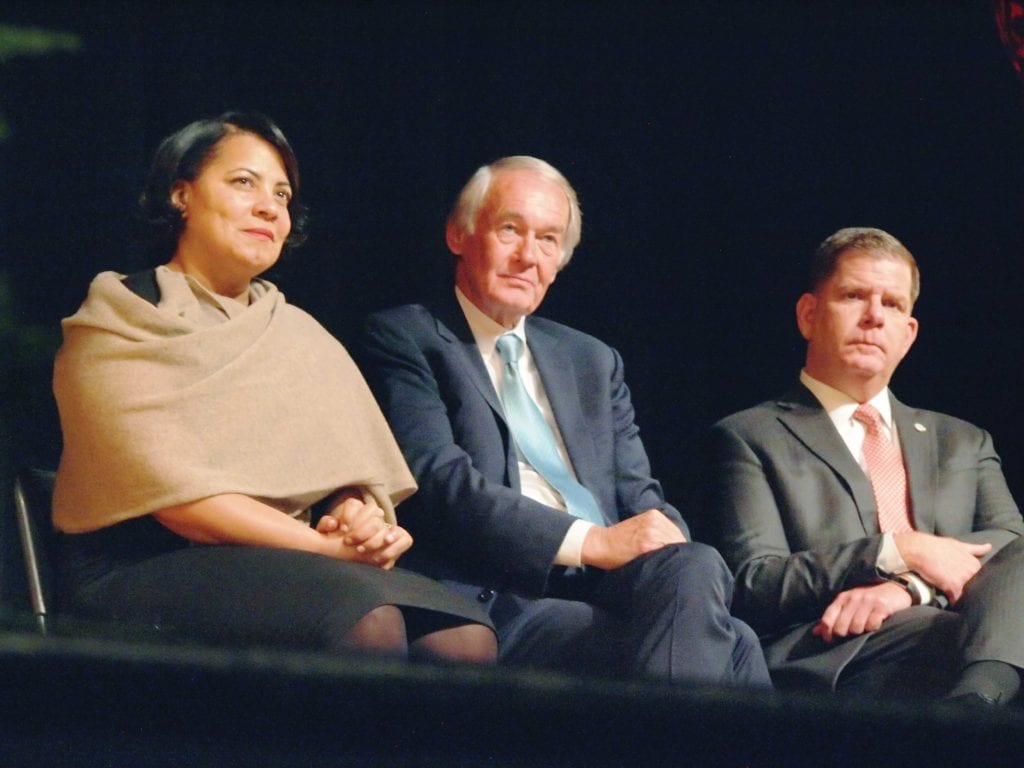
Suffolk County District Attorney Rachael Rollins, who has caused controversy with her campaign promise not to prosecute 15 minor crimes, was sworn in last week in a ceremony at Roxbury Community College.
Two weeks ago, the Indianapolis-based National Police Association filed a formal complaint against Rollins, saying her refusal to prosecute misdemeanor crimes would go against her responsibilities as district attorney.
“Rollins’ role as district attorney for Suffolk County is no substitute for the role and obligations that control the Massachusetts Legislature, no matter how much Rollins may wish to the contrary,” the advocacy group’s complaint stated. “Further, Rollins’ blatant disregard for the legal system, specifically the laws of Massachusetts, is further violative of Rollins’ professional obligations.”
The complaint also asserted that Rollins’ public decision not to prosecute these crimes will increase crime rates, jeopardizing the safety of law-abiding citizens.
The list of crimes, which Rollins posted on her campaign website, include trespassing, shoplifting, larceny under $250 and receiving stolen property, among others. Rollins said the misdemeanors should be dismissed or treated as a civil infraction with community service or restitution as punishment instead of incarceration. In extenuating circumstances, these charges may be prosecuted, but the prosecutor must first seek permission from his or her supervisor.
Rollins’ policy follows a similar trend among other progressive district attorneys around the country, including District Attorney Larry Krasner of Philadelphia. Rollins’ policy would prevent law enforcement and prosecutors from over-charging defendants with many minor violations for one incident, effectively guaranteeing a court date and conviction.
Rollins released a statement following the National Police Association complaint, saying, “The voters have spoken and they want change. … My team and I are going to work every day to fix our criminal justice system that doesn’t work for too many people, and create one that is fair and just for everyone.”
Staying the course
Boston Police Commissioner William Gross told the Banner that the new policy will not stop law enforcement from making arrests in incidents concerning minor offenses.
“You commit a crime in Boston that is an arrestable offense, I will arrest you,” Gross said. “Some people have this misconception that they can go shoplifting. No. If it’s a crime, you will be locked up. We’ll use our discretion to do so on a case-by-case basis.”
Massachusetts Sen. Ed Markey, who spoke at the swearing-in ceremony, supported Rollins’ policies in his remarks, comparing them to federal criminal justice reform legislation passed by the United States Congress last month.
“I know that Rachael is going to become the national leader in showing how this reform has to be implemented at the local level,” Markey said.
Boston Mayor Marty Walsh praised Rollins as someone who “identifies with the underdog.”
“We are a city that’s better off when we lift people up instead of locking people up,” Walsh said. “We are a city that believes in second chances.”
During her address, Rollins sought to reassure local police officials, greeting commissioners by name from the stage and acknowledging that many in law enforcement are nervous about her reforms.
“Nervousness is exactly what change needs, and we’re gonna be okay,” she said.






